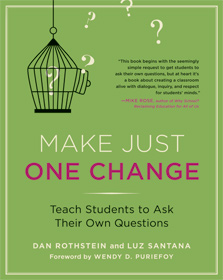To Ask or Not To Ask: Why Asking Questions is a Priceless Skill For College and Beyond
Recently I sat in on a meeting for career counselors focused on providing support to First Generation college students and New American students. But before I say more about this meeting (it was incredibly informative and interesting) let me share a brief anecdote with you.
It’s the first day of the first semester of her first year in college. A student who commutes to school to save money comes fully prepared with all the necessary books and texts for the first week (even for classes that don’t occur on that day — just in case). She attends her first course and sits excitedly in the front of the lecture hall. Shortly after the class ends, she goes to eat lunch. But she’s not sure where she can go to eat — she doesn’t have a meal plan and therefore can’t swipe into the dining hall. And she’s too nervous to ask any questions — nervous she might be seen as an impostor. So she eats in her car and wonders if she really belongs on this campus.
A first generation college student shared this reflection with the group and the reaction was a room of heads nodding in agreement. Over and over counselors in the room mentioned that it is absolutely essential for students to be willing and able to ask their own questions in order to successfully navigate college. One counselor made note of the ample resources available to students that students discover too late or never at all because of a fear of asking questions and being “called out” as not belonging.
How do we change this?
Simply encouraging students to ask questions may not be enough and preparing students academically so that they can ace an exam also may not be enough. Recently, Erik Shonstrom wrote in Education Weekly, “Curiosity, it can appear, is a luxury the poor can ill afford; better for them to buckle down and get the basic, requisite skills to bootstrap themselves out of poverty and into gainful employment.” What’s missing from Erik Shonstrom’s statement is the focus on college. Many schools educating disadvantaged children are focused on students bootstrapping themselves out of poverty by way of college and gainful employment. Yet, we have not learned all we could from students who have gone onto college and faced challenges navigating campus life in and outside of the classroom.
Sitting in that room with career counselors and first generation college students, I learned of many many obstacles and challenges that students faced because they were not asking questions. It is critical that we deliberately teach students, especially those from disadvantaged backgrounds, how to ask their own questions and navigate systems. Let’s not wait until college for students to have to develop these skills.
In order to do that, we have to appreciate “not knowing” or the willingness to learn and grow, even if it means failing. The idea or perception that more privileged, intelligent, wise, successful individuals are in the know and therefore do not ask questions sets up a false dichotomy. In my personal experience navigating between Newark, NJ and Harvard University in Cambridge, MA, I’ve seen that those who are most successful, most respected, and learn the most are those who know when and how to ask the right questions. Those students who get the resources they need, who get the information they need, who most easily thrive in and outside of the classroom are those who are constantly asking questions and claim their ability to ask questions as an indication of their human and social capital.
So, in reflecting on this meeting, I am excited about offering a professional development session on the Question Formulation Technique to the Boston area career counselors next year! But I’m even more excited about the students who will be building their question asking muscles and using those skills to navigate systems, familiar and unfamiliar. As you may have thought by now, these skills can benefit all students as well as you and I.
Monthly I will be sharing reflections on RQI’s partnerships or professional development sessions. If you have experiences to share or would like to hear more, leave a comment below.





Lavada,
Thanks for this very thoughtful piece weaving together your own experiences, lessons from the field and an analysis of what needs to change. You got me thinking about lots of things. Specifically, I wonder about the student you describe:
If she were afraid or reluctant to ask questions to help herself or navigate life on campus, when did that fear or reluctance take root?
What would change that?
Would being encouraged to ask questions be sufficient to get her to ask questions?
What is the difference between an institution that “encourages” students to ask questions or “invites” their questions vs. one that commits to insuring that all students know how to ask better questions and have the chance to develop that skill?
And, if the problem you named is not addressed, how might the failure to do so undermine other efforts the institution may make to compensate for students not asking their own questions?
So, all this makes me wonder: Is not knowing how to ask questions a contributing factor to powerlessness or an indicator of powerlessness ? Or, might it be both a contributing factor to and evidence of feeling powerless?
Either way, as you describe it so clearly, students equipped with the ability to ask their own questions have a better chance at navigating their way through institutions, big and small.
Dan,
Yes! Yes! Yes!
You’ve noted some incredibly important questions for all of us to ponder. Perhaps I’ll start the PD session with some of these questions.
Lavada,
Thank you so much for sharing! RQ needs to be a hallmark of educational efforts for critical thinking. I work with underprepared or under-achieving college students, and self-confidence is a huge factor in being willing to ask questions. Sometimes offering students a time or place to ask questions is almost as ineffective as telling students answers to things they don’t care about or don’t think they need to know. If we do not create habits of self-directred learning and curiosity, teach skills to observe and ask questions, or offer an emotionally safe place to be vulnerable to ask the question, we will continue to see students missing opportunities for growth and success.
I completely agree Pam. Building the habit of self-directed learning and establishing a safe place are key aspects of making campuses a place where students feel comfortable asking questions… even more than comfortable…where asking questions is common practice for all students.
Thanks so much! I’m going to share this with my staff. Please share more!
Sounds great Shalanda! Let us know how it goes with your staff.
Hi Lavada:
From my experiences with having a teenage son, the challenge of helping students ‘speak up begins much, much earlier than the college years. I have heard terrible stories about attempts to ask questions in the classroom at a much more sensitive age only to be shot down very quickly by the adults in control of the classroom. In my view, teachers need to learn to foster discussion instead of moving full-steam ahead at any costs to maneuver through the curriculum. I also think fostering team-based initiatives immediately upon entering college with goals introduced early on will help in this area. We learn from one another. As a college student I gained a LOT by being involved with other students. ~Take care!
Denise,Yes! We are on the same page — it must must begin earlier. That requires educators and parents creating environments and using strategies that encourage questions rather than shut them down as you mention. Yes to group work as well — are you familiar with RQI’s Question Formulation Technique? It involves both components that you mention — group work and questions. You take care as well!